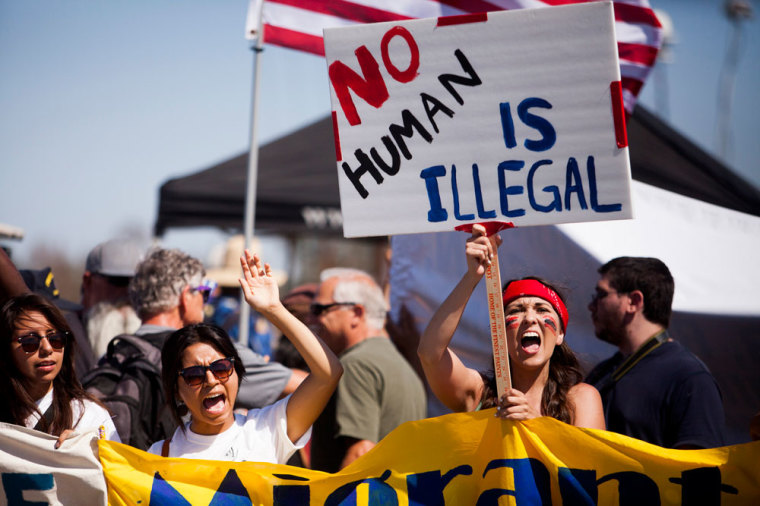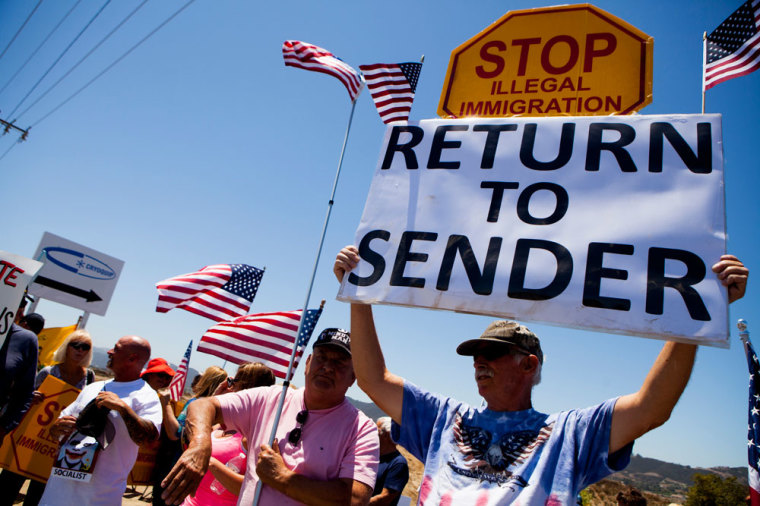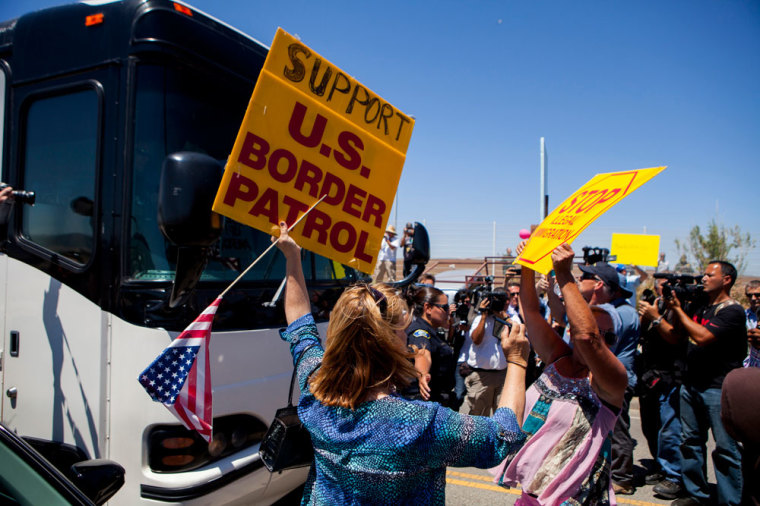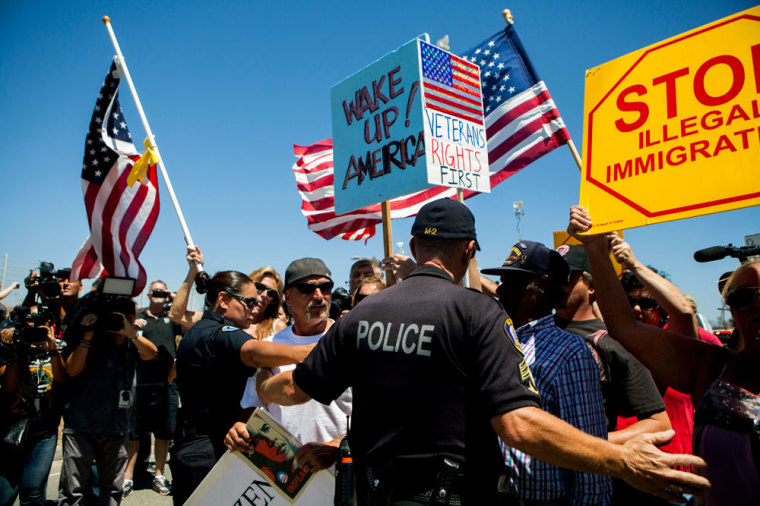US Border Crisis: Caring for Children Is Top Priority, Says Faith Leader Who Met With Obama, Perry in Dallas

One faith-based leader who met with President Barack Obama and Governor Rick Perry in Dallas Wednesday says the private meeting with local officials and faith leaders was productive in homing in on solutions that will meet the state's most immediate needs in dealing with the border crisis.
Despite appeals from members of his own party to accept Perry's invitation to tour the U.S.-Mexico border where the humanitarian and national security crisis is unfolding, Obama declined, opting instead to meet in Dallas before attending one of three Democratic fundraisers in the state.
"The purpose of the meeting was to find solutions in dealing with the border crisis in Texas," Chris Liebrum, director of disaster recovery for the Texas Baptist Convention told The Christian Post Wednesday night.
"Our message and focus is on the children," Liebrum added. "We need to care for the children who are here now — that was my message to the president. We have a big immigration problem that needs to be solved; and it's the lack of a good immigration policy as to why this crisis, this disaster, has come about."

Following Wednesday's meeting, Obama held a brief news conference and suggested that there wouldn't have been a border crisis had the House passed immigration reform last year. He then defended his decision not to tour the southern border because, as he said, "I'm not interested in photo ops."
"Why aren't we passing comprehensive immigration reform which would put an additional 20,000 Border Patrol agents [on the border] and give us a lot of additional authorities to deal with some of these problems?" Obama asked. "That should've been done a year ago; it should've been done two years ago. It's gotten caught up in politics."
Obama emphasized, many times, that he's asking Perry to pressure the "Texas delegation" and other border-state Republicans in Congress to approve $3.7 billion in supplemental emergency funding to help resolve the border crisis.
Perry, however, asserted on Fox News' "Hannity" that less than 2 percent of those funds would go toward border security; and he continues to ask the president for 1,000 National Guard troops to patrol the border temporarily until 3,000 new Border Patrol agents are trained.
During his testimony before members of the U.S. Homeland Security Committee last Thursday in McAllen, Perry explained that Texas only has seven Border Patrol agents per mile for its 1,200-mile border with Mexico; unlike California, New Mexico and Arizona, which have 17 agents per mile patrolling their southern border.
While politicians continue to debate solutions for resolving the border crisis, Liebrum told CP that the federal government has the responsibility to take care of the physical needs of the children who've entered the country illegally.
"The federal government has the responsibility, through a private contractor, to take care of the physical needs of these children — food, clothing, shelter, security, medical, all of that will be contracted out," he said. "What they will want from nonprofits and NGOs is help with other activities."
The terminology the government is using to describe assistance faith-based organizations are providing is "socialization resources," according to Liebrum, who said this includes sports and other physical activities, and non-sectarian, ecumenical services.
Christian nonprofit volunteers won't be proselytizing to the children, Liebrum asserted, adding that many of them "come from religious backgrounds."
"Some of the shelters are being told that they're responding to those kinds of (religious) activities," he continued. "There can be other things, too, that faith-based organizations can do, depending on what the contractor needs."
When asked by CP if the faith-based communities represented at the meeting had formed a consensus on whether or not the children should be deported or allowed to stay in the U.S., he said they had not.
Other issues discussed in the meeting dealt with solutions to "shortcut the processing of the children, because it's taking too long," Liebrum said.
"There was a discussion about how to handle children who have physical and medical needs. And suggestions about what we could do in these countries to keep them from coming — in a positive way. Instead of spending billions of dollars here, what could happen if we spent that kind of money and created an atmosphere that would keep them from coming, in the sense that they would have what they need there. Those are some of the discussion points. But a lot of it was about the problem at hand in Texas and what we do now," Liebrum explained.
Liebrum added that the meeting was cordial; and while there were political differences among the group, "they were dealt with by both parties with great respect." He also noted that Obama and Perry had the opportunity to meet privately for 15 minutes and talk in a separate room before meeting with faith leaders and local officials.
Those who attend the border crisis meeting at Love Field Airport in Dallas include: Dallas Mayor Mike Rawlings; Rep. Eddie Bernice Johnson (R-Texas); Grand Prairie Mayor Ron Jensen; Chris Liebrum of the Baptist General Convention; Arne Nelson of Catholic Charities; Dallas County Commissioner Elba Garcia; Dallas County Judge Clay Jenkins; Texas Health and Human Services Director Kyle Janek; Texas Public Safety Director Steven McCraw; and the director of Baptist Child and Family services who has contracted with the shelter at Lackland Air Force Base in San Antonio.
Gov. Perry has requested the following actions from President Obama:
- Visit the Texas-Mexico border to witness firsthand the impact of the border crisis;
- Deploy an additional 1,000 National Guard troops to the Texas-Mexico border to immediately enhance border security operations;
- Direct the Federal Aviation Administration to allow the National Guard to utilize Predator drones along the Texas-Mexico border for identifying and tracking human and drug trafficking;
- Medically screen all illegal immigrants to ensure their health and the health of our citizens;
- Direct the Centers for Disease Control or another appropriate federal agency outside the Department of Homeland Security to conduct, in conjunction with the Texas Department of State Health Services inspections of facilities in which illegal immigrants, including UACs, are being housed to ensure accepted international and national emergency sheltering standards are met;
Modify or rescind policies that serve as a magnet to encourage illegal immigration, including:
- DHS Catch and Release policies by which DHS issues an illegal immigrant an NTA before an immigration judge and releases them. The U.S. Department of Justice reports that 33 percent of those released on their own recognizance failed to appear in FY 2013.
- Deportation policies and procedures that prohibit UACs from countries other than Mexico and Canada from being immediately repatriated back to their country of origin. After DHS processes these UACs, they are issued an NTA and delivered to a sponsor or relative in the United States, regardless of the relative's immigration status.































